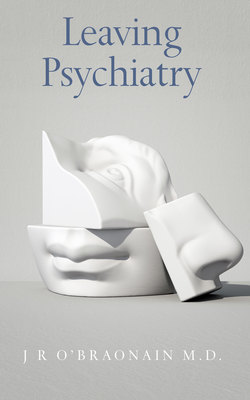Leaving Psychiatry

Реклама. ООО «ЛитРес», ИНН: 7719571260.
Оглавление
J. R. Ó’Braonáin. M.D.. Leaving Psychiatry
Leaving Psychiatry
Contents
Introduction
Ontogeny. Entering Seminary
Ontology. The Keeper of the Keys
Epistemology. Cogito, Ergo Cogito
Relativity. The Truth Makers
Demonology. I, Father Karris
Morality. The Psychotherapy of Dorian Gray
Bio-Alchemy. Tabula Ruina
Responsibility. Akrasia and Enkrateia
Sanity. On Agreeing to Disagree
Thanatology. On Private Property
Liberty. Climbing Mt Szasz
Possibility. What if it All Went Away?
Отрывок из книги
Ontogeny; Entering Seminary.
Ontology; The Keeper of the Keys.
.....
Child psychiatrist 2 formulates the case thus; the child has developed an anxiety disorder. Anxiety is the kissing cousin of fear. When we are afraid we take flight or fight, i.e. in fight mode we manifest aggression under a range of behavioural and affective modes which includes irritability, if not frank violence. In flight mode we may simply withdraw. Anxiety explains the recent truancy, the inattention, the neuro-vegetative dysfunction and, given the unpleasantness of the anxious child’s inner world, can lead to thoughts of suicide. Anxiety isn’t fun and can lead to feeling depressed under the weight of fear. In any case, all roads lead to Rome. Another script of antidepressant is written, for as luck would have it, so called antidepressants are also anxiolytics. Or so they say. This psychiatrist might also refer to a psychologist skilled in the childrens version of CBT, depending on age and maturity.
Psychiatrist number 3 will diagnoses little Jaxxson with ADHD, attention deficit hyperactivity disorder (which is actually an umbrella term which should read attention deficit and/or hyperactivity disorder). How will our psychiatrist manage to accomplish this diagnosis? Actually it’s a simple affair, for if you read the literature of academic and clinical fans of the diagnoses, ADHD can be had in those who are high achievers or low, in those who are dreamy absent minded introverts or rambunctious spinning toys of boys tearing around the classroom like a whirlwind. With a pinch of imagination and an ounce of inclination (the latter of which I lack), I could easily formulate about half of my child and adult patients with ADHD, including of course most drug addicts. With Jaxxson, we could say his recent lack of attentiveness and drop in academic achievement is merely an unmasking of the so called “neurodevelopmental” disorder that has always been there. Perhaps they will justify the diagnosis on the basis of being “unmasked” in virtue of the growing mismatch as schooling progresses between expectation and capacity vs his peers. Perhaps things will be explained in terms of the current teacher being less entertaining, for ADHD kids respond better to novelty and wither on the vine of routine unless domesticated with medication. On a similar vein, we can explain how the child can sustain attention for prolonged periods on videogames and other devices, and not on schoolwork. These little machines are enjoyable. Small victories along the way of the game provides the little squirts of dopamine that the childs brain lacks in virtue of the chemical imbalance they are thought to have (though the savvy clinician won’t use the term “chemical imbalance” now the critical psychiatric community has run it out of town….…for now). Why the apparent depressive symptoms? Being hyperactive or inattentive leads to conflict that can lead to a challenge in ego strengths, a sense of knowing one lacks academic competence or comparative social successes. The child is irritable (or downright depressed looking) on account of these frustrations and failures. Psychiatrist number 3 will prescribe a powerful stimulant that is illegal in recreational use, plus/minus the antidepressant for the mood symptoms. As a footnote, I might add that the criteria from which ADHD is formulated in the child can also be seen as a reflection of immaturity per se. There is abundant evidence that the diagnosis is overrepresented and can be predicted by the child simply being the youngest in the class. The diagnosis can also be explained by a certain mix of what psychologists call the “big 5” personality traits and, in boys at least, a “pathological” mismatch between the child’s needs for stimulation and rough and tumble activity of village or tribal life and the schools demands for moulding the cog in the machine as he is told to sit for 6 hours. It is worth noting in closing that ADHD is the example par excellence of the fallacy of the response to medication proving the existence of a diagnosis. Amphetamines (and methylphenidate) have psychotropic effects on persons taking them, be they diagnosed with ADHD or not. And these effects can be notionally salutary to both in similar domains of behaviour and function. This has been known since the time of Smith, Kline and Frenchs early marketing of benzedrine and Bradleys early experiments with stimulants on the grab bag of traumatized, rejected, intellectually delayed, delinquent or basal gangliopathic children he treated. Amphetamine aids the concentration of all up to the mind it renders them only thinking they have improved cognition, this being the mind they are half way to drug induced madness. Finally, it is worth noting that the evidence does not support the conclusion of long term benefit to children of taking stimulants. Over the long term they are either useless or harmful.
.....